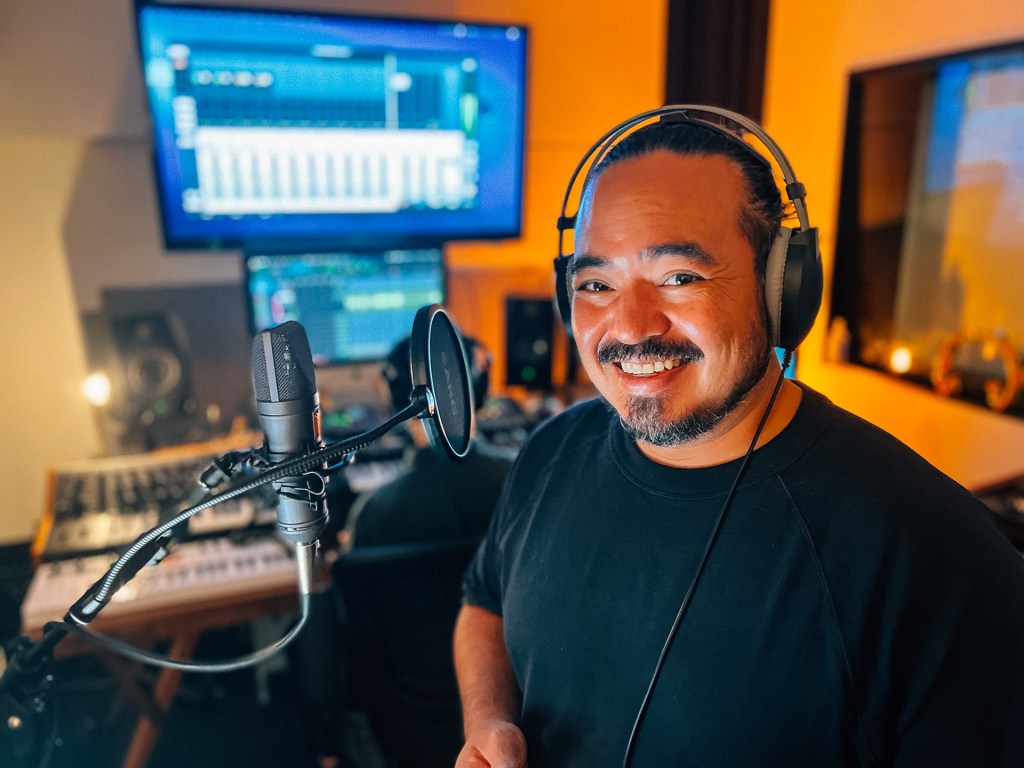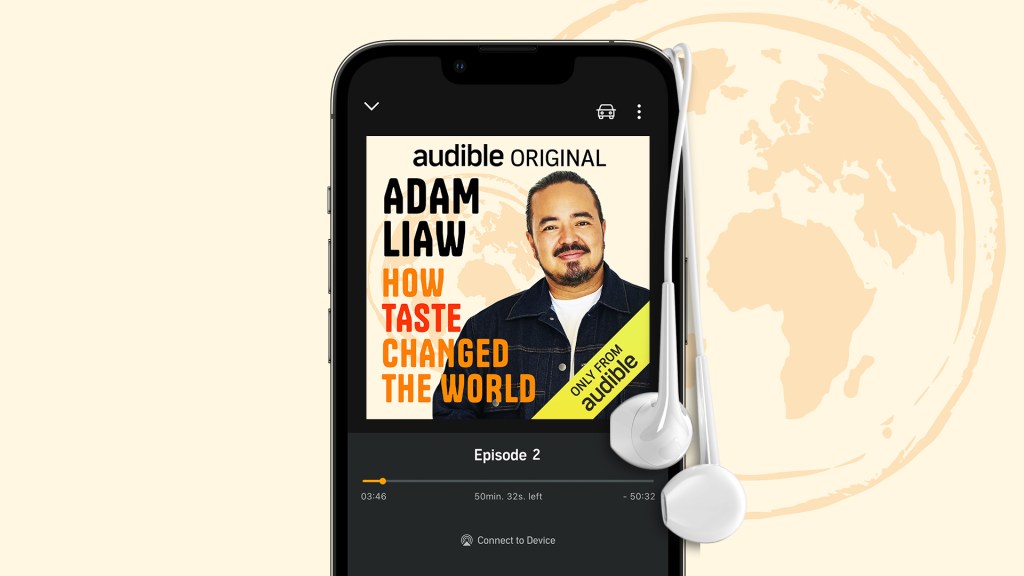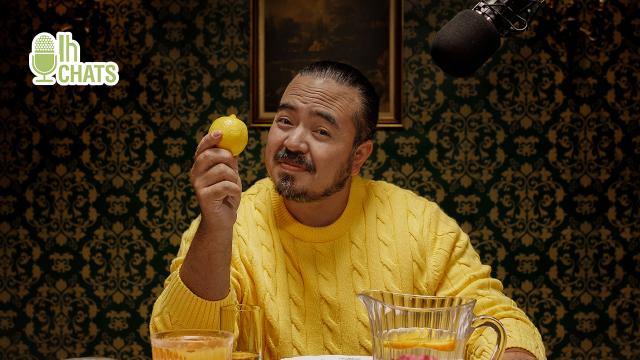Iconic Aussie cooking personality Adam Liaw has taught his audiences a whole lot about food. From advice on picking a ripe watermelon to boiled egg hacks, his expertise has changed our kitchens for the better in a myriad of ways over the years. But now, with his new podcast How Taste Changed the World, Liaw wants to take our understanding of cooking back to the absolute basics: the science of taste.
Lifehacker Australia chatted with Adam Liaw about the launch of the new Audible Original podcast, what inspired it and a few of the key learnings to listen out for when you smash through it yourselves.
The description of the podcast reads as follows:
Join Australian cook Adam Liaw as he investigates the science and history of our five tastes – sweet, bitter, salty, sour and umami. Our taste for salt is vital to our biology but it also turned food into a commodity underpinning global economics for thousands of years. Sweetness that once guided our evolutionary forebears to energy-rich fruits is now used to sell us soft drinks. Deliciously immersive, this epic new Audible Original unravels how taste has shaped our food, our society and our planet.
And while that’s certainly a head-turning concept, the idea at the root of How Taste Changed the World is really quite simple, Liaw explained over the phone.
“I guess it started off because I just wanted people to cook more simply,” he said.
“And to me, the key to cooking simply is to look at taste, because we can get very confused with the number of things that we’re told to do in cooking. But at the end of the day, it all comes down to how the food tastes, and how food tastes is defined, quite literally, by our sense of taste and our sense of taste is limited to five things. We call them the five basic tastes, but they’re the five only tastes. We only taste five things with our mouths and that’s salty, sweet, sour, bitter, and umami.
“Everything else is, I guess, nice, but it’s not as important as taste.”
An introduction to the five only tastes

While most of us are likely to be familiar with at least a few of the five tastes, it’s very possible that you’re not completely across all of them.
Liaw explained that “if you ask the average person on the street to name the five tastes, they probably won’t even get all the way to five, they might get four. But all five are so important and so fundamental”.
So, let’s take a look at each of them, shall we? Salty, sweet, sour, bitter, and umami.
You can find each of these tastes in a range of foods, and Liaw shared that “we have a source for salty, sweet, sour, bitter and umami in kind of every cuisine”.
“Salt is obviously salty. Sugar is sweet. Sourness can be vinegar or citrus or something like that. Bitterness tends to be things like oils…” he said.
“Things like pepper are bitter. Almost all the vegetables and ingredients we use have some bitterness to them, so we don’t tend to add too much bitterness other than in the form of pepper…
“…And then umami is this kind of savoury taste that we produce, often during cooking by adding things like stock. Stock is essentially an umami liquid.”
The goal at the heart of good cooking is achieving a balance of flavours and using them to guide you in figuring out what your dish needs.
“If you have a spaghetti bolognese and it tastes too sweet, you grind some pepper on that, and that adds bitterness to take some of that sweetness away,” Liaw offered as an example.
He also highlighted how the flavour profile of ingredients has the potential to make or break a dish.
“Wine is in umami liquid, so you can boil something in wine and make it taste good – like coq au vin. But if you brought it in something that was similar, like grape juice that wasn’t fermented, it would be terrible.”
By building an understanding of the power of these elements, Liaw believes cooking can become much more straightforward for many people. “You can actually make something taste good with very, very few ingredients,” he said.
Our experience of taste is biological – we can learn from that
Now that we have a better understanding of what the five tastes are, let’s take a moment to reflect on why we experience them. You may not realise this, but our experience of taste is directly related to our biological makeup. For this reason, other animals do not have the same tastes we do.
“Like, a mouse has a taste for starch,” Liaw shared.
“We don’t have a taste for starch, and yet 73 per cent of all the calories human beings consumed come from starch. We eat grains, we eat bread and potatoes and rice, but we don’t have a tastebud for that. That mouse does. So if a mouse eats like a piece of wheat, that tastes delicious to a mouse as a ripe apple does to us.”
Fascinating, no? In the case of humans, Liaw explained that bitterness has historically been a signal to us that something may toxic to us. So, kids who don’t want to eat vegetables? They’re just following what evolution intended.
“Our sense of taste kind of guides us to what’s good and bad, and every vegetable has some bitterness in it… so we get angry with kids for not liking something that biologically they shouldn’t like,” he said.
The secret here, he explained, is to slowly teach ourselves (and kids) that these kinds of flavours aren’t so bad. “If you give them a positive experience around those vegetables, the more likely they are to actually like them in the long run.”
“We have an amazing ability to learn like foods,” Liaw continued.
“It’s kind of what we’re built for. We are omnivores, and the whole process of survival is around learning like things and understanding what’s good and what’s bad.”
What else to expect from Adam Liaw’s new podcast

More than just an exploration into the science of taste and the history of its influence on the human experience, How Taste Changed the World promises an eye-opening look at how masters cook. Along with the expertise of Liaw himself, the podcast features insights from some of his “food idols”, Yotam Ottolenghi, Dan Barber, Kenji Lopez-Alt and Fuchsia Dunlop.
“You get to stand in Yotam Ottolenghi’s kitchen and go, ‘What’s next to his stove?’ ‘How does he cook?’ ‘What are the things that he does to make food tastes better?’ And that kind of personal approach, and that personal insight into what someone like Ottolenghi is doing in his own kitchen is really really valuable,” Liaw shared.
But overall, Liaw’s podcast is just a means of helping people learn to become more confident in the kitchen.
“Taste is absolutely the key to cooking better. If you don’t know how to taste and you don’t have a season, you can’t know how to cook…”
So, let’s start learning then, shall we?
Adam Liaw’s Audible Original podcast, How Taste Changed the World launched on Tuesday 10 May and is only available on Audible. The podcast is free for Audible members and can be found at audible.com.au/taste. On 1 June, Adam will be taking part in Vivid Sydney’s Ideas Exchange with Audible Live: Stories Made to be Heard, during which he’ll discuss the podcast in further detail.

Leave a Reply
You must be logged in to post a comment.